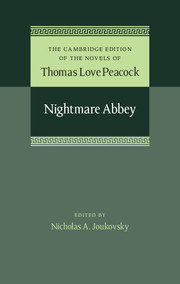Book contents
- Frontmatter
- Contents
- List of Illustrations
- General Editor’s Preface
- Acknowledgements
- Chronology
- List of Abbreviations
- Introduction
- Nightmare Abbey
- Appendix A Peacock’s Preface of 1837
- Appendix B An Essay on Fashionable Literature (1818)
- Appendix C The Four Ages of Poetry (1820)
- Note on the Text
- Emendations and Variants
- Ambiguous Line-End Hyphenations
- Explanatory Notes
- Select Bibliography
Chapter III
Published online by Cambridge University Press: 30 June 2022
- Frontmatter
- Contents
- List of Illustrations
- General Editor’s Preface
- Acknowledgements
- Chronology
- List of Abbreviations
- Introduction
- Nightmare Abbey
- Appendix A Peacock’s Preface of 1837
- Appendix B An Essay on Fashionable Literature (1818)
- Appendix C The Four Ages of Poetry (1820)
- Note on the Text
- Emendations and Variants
- Ambiguous Line-End Hyphenations
- Explanatory Notes
- Select Bibliography
Summary
MR. GLOWRY returned from London with the loss of his law-suit. Justice was with him, but the law was against him. He found Scythrop in a mood most sympathetically tragic, and they vied with each other in enlivening their cups by lamenting the depravity of this degenerate age, and occasionally interspersing divers grim jokes about graves, worms, and epitaphs. Mr. Glowry's friends, whom we have mentioned in the first chapter, availed themselves of his return to pay him a simultaneous visit. At the same time arrived Scythrop's friend and fellow-collegian, the Honorable Mr. Listless. Mr. Glowry had discovered this fashionable young gentleman in London, “stretched on the rack of a too easy chair,” and devoured with a gloomy and misanthropical nil curo, and had pressed him so earnestly to take the benefit of the pure country air, at Nightmare Abbey, that Mr. Listless, finding it would give him more trouble to refuse than to comply, summoned his French valet, Fatout, and told him he was going to Lincolnshire. On this simple hint, Fatout went to work, and the imperials were packed, and the post chariot was at the door, without the Honorable Mr. Listless having said or thought another syllable on the subject.
Mr. and Mrs. Hilary brought with them an orphan niece, a daughter of Mr. Glowry's youngest sister, who had made a runaway love-match with an Irish officer. The lady's fortune disappeared in the first year: love, by a natural consequence, disappeared in the second: the Irishman himself, by a still more natural consequence, disappeared in the third. Mr. Glowry had allowed his sister an annuity, and she had lived in retirement with her only daughter, whom, at her death, which had recently happened, she commended to the care of Mrs.Hilary.
Miss Marionetta Celestina O’Carroll was a very blooming and accomplished young lady. Being a compound of the Allegro Vivace of the O’Carrolls, and of the Andante Doloroso of the Glowries, she exhibited in her own character all the diversities of an April sky. Her hair was light-brown: her eyes hazel, and sparkling with a mild but fluctuating light: her features regular: her lips full, and of equal size; and her person surpassingly graceful. She was a proficient in music.
- Type
- Chapter
- Information
- Nightmare Abbey , pp. 17 - 21Publisher: Cambridge University PressPrint publication year: 2016

